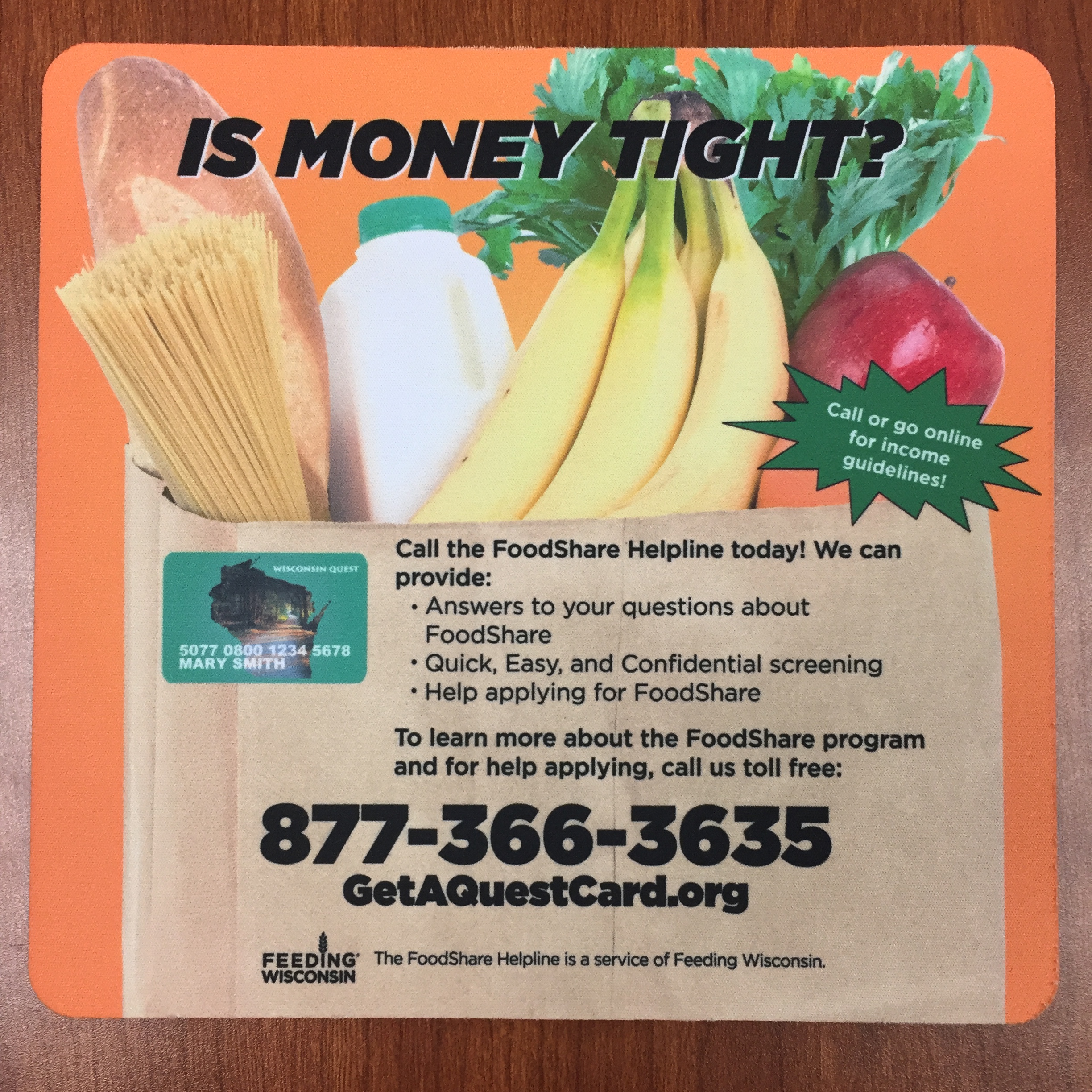Stories from the Field: Fighting Hunger and Improving Health
| Comments
Hunger and health are intimately connected. This became incredibly clear to us in the wake of the 2008 Great Recession when food banks in Wisconsin and across the nation began hearing a story that involved a family needing help from the food bank because a family member had an accident or illness and due to a the massive job dislocations at the time, also lost their employer provided healthcare.
The most common refrain, "I never thought I ever need help from the food pantry until I got sick and the medical bill started to pile up."
As members of Congress continue to debate the future of healthcare, potential changes to the structure and funding of important healthcare programs like Medicaid (BadgerCare in Wisconsin) and Medicare concern us, as any cuts would undoubtedly continue to put pressure on the household budgets of our friends and neighbors utilizing these programs for their healthcare.
At the same time, Congress continues to mull over massive cuts to SNAP (FoodShare in Wisconsin). SNAP and health programs like Medicaid and Medicare work in concert with each other to ensure that all eligible families have the food and healthcare they need to work toward a better tomorrow.
It is possible that if the cuts to Medicaid, Medicare and FoodShare are implemented at the scale proposed, we will likely hear a new version of the story I alluded to, with a new refrain: "I always thought that I could move on from the food pantry and be more healthy but then I lost FoodShare and Medicaid.”
It is with this in mind that we bring you a few stories from the field, collected by our food banks' FoodShare Outreach Specialists that highlight how FoodShare helps to maximize improve the health of people living in Wisconsin.
Betty and Dave
Before “Betty” and “Dave” retired, they were farmers. Now in retirement, they were trying to figure out how to live off of their joint Social Security income, which amounted to less than $1,200 a month between the two of them (less than $14,400 a year).
Betty explained that when you add up all of their monthly expenses, such as supplemental health insurance, auto insurance, home insurance, drug insurance, medications, hospital bills, property tax, utility costs, etc., they would often run short of money by the end of the month and when that happened they would have to choose between paying the bills, buying food or getting medications. As former farmers, knew how to be frugal but this was impossible. The first sacrifice was always food, the next would be medication, and the last resort would be paying less on all of their other bills.
When they received a letter about FoodShare benefits, they were intrigued. They had never heard of the program and so they decided to call the FoodShare Helpline to learn more. They were found to be eligible for FoodShare and Energy Assistance and they were referred to the Medicare Assistance Plan—which would put an extra $210 each month in their pocket. Betty and Dave also looked to enrolling in Senior Care, a prescription drug plan that costs $30/year, far less than what they had been paying.
Betty and Dave had never heard about these important programs. While it was a tough decision for them to ask for and get help because as they said, "we farmed all our life and just did what we had to do to get by," they were very glad to have done it because now they have just a bit of help to cover their food and medical care.
Rich
“Rich” is from a small town in Wisconsin and worked at the same place for 30 years. He recently had to  begin dialysis because of kidney failure. Despite having health insurance, the cost of medication, the dialysis and the loss of income has taken a toll on him physically and financially. While he has lived an extremely frugal life and has few needs, health and food are two that he can't sacrifice.
begin dialysis because of kidney failure. Despite having health insurance, the cost of medication, the dialysis and the loss of income has taken a toll on him physically and financially. While he has lived an extremely frugal life and has few needs, health and food are two that he can't sacrifice.
Then, one day, while working on a computer at a local library, Rich saw information about FoodShare on a mouse pad. Not knowing anything about FoodShare, he the FoodShare Helpline to learn a little bit more. After a conversation with our friendly staff, Rich thought the program could help him.
A few days later, one of our Outreach Specialists met him and helped him through an application, as well as introducing him to a number of other programs that could help him, like energy assistance, the ADRC for rides to and from his dialysis appointments, and the Medicare premium assistance program.
Rich now gets $110 a month on his FoodShare card, assistance to his dialysis appointments three times a week, has received energy assistance, and is in the process of applying for MAP.
A few months ago, Rich was struggling to figure out how to get help with his increasing bills and transportation to his dialysis appointments. Now, after seeing a mouse pad in a library with information about FoodShare and the HelpLine, he won't worry about his next meal or getting the medical care he needs.
